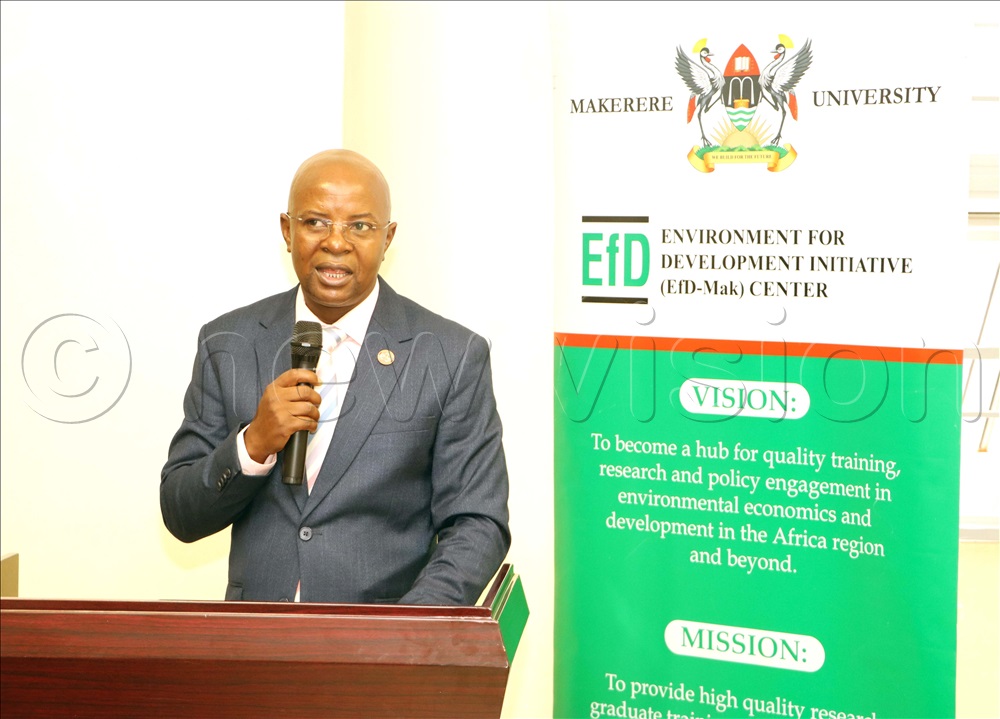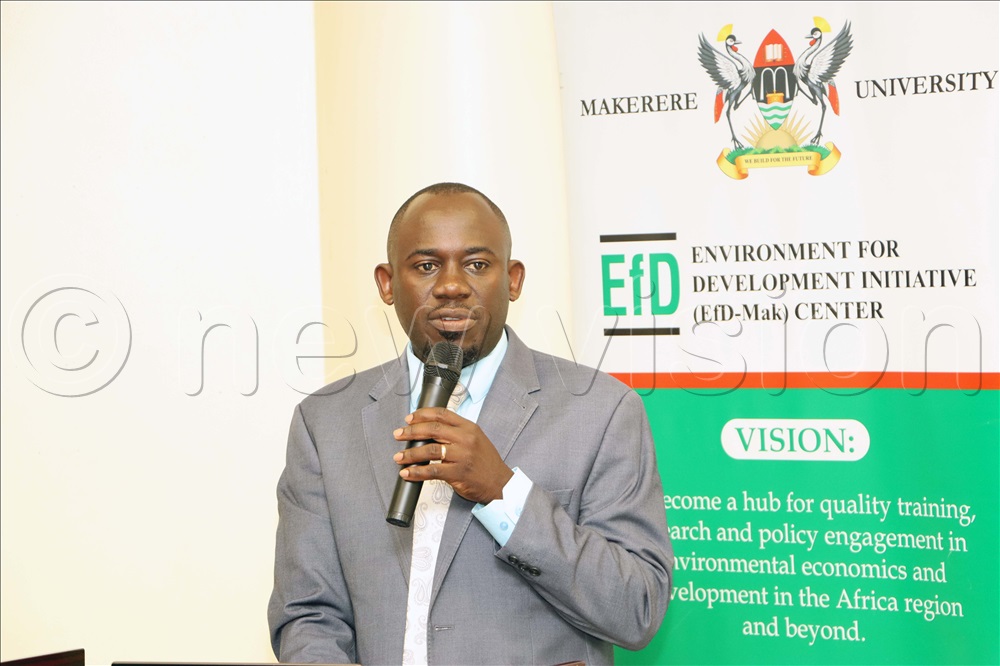Uganda urged to enforce community participation to safeguard biodiversity
Prof. Muchapondwa emphasised that biodiversity cannot be protected in isolation from the people who depend on it.
Prof.Muchapondwa, facilitating the two-day training for government officials and natural resource managers at the Environment for Development Makerere (EfD-Mak) Center, Makerere University. (Photos by John Odyek)
________________
Uganda’s efforts to protect its rich biodiversity will only succeed if local communities are legally empowered to take part in conservation, experts have warned.
They add that valuing biodiversity resources in economic terms is equally critical for long-term protection.
This call was made by Prof. Edwin Muchapondwa, an economist from the University of Cape Town, during a two-day training for government officials and natural resource managers at the Environment for Development Makerere (EfD-Mak) Centre, Makerere University.
The training, held under the theme “Biodiversity Conservation, Community-Based Natural Resource Management and National Parks Valuation & Regulation”, explored how conservation can be strengthened while also improving livelihoods and guiding national development priorities.
Valuing nature in economic terms
Prof. Muchapondwa emphasised that biodiversity cannot be protected in isolation from the people who depend on it.
Prof. Bbaale addressing participants attending the two-day training for government officials and natural resource managers at the Environment for Development Makerere (EfD-Mak) Center, Makerere University. 
He argued that while Uganda’s forests, wetlands and wildlife provide essential services such as clean water, fertile soils, food, fresh air and even medicines, these benefits are often invisible in planning frameworks.
“When decisions have to be made, whether to conserve or to develop, economic valuation of natural resources provides an objective basis for trade-offs,” he said on August 21, 2025.
He urged Uganda to adopt tested valuation models in use elsewhere. The challenge, he added, lies not in policy design but in effective implementation.
Communities as custodians
Central to his message was the role of local people. “Communities must be recognised as key stakeholders, and legal frameworks should guarantee their participation,” Muchapondwa stressed.
He noted that conservation efforts often fail when communities living near parks, wetlands and forests are excluded, yet their involvement is crucial to reducing conflicts and ensuring sustainability.
“When communities understand the value of wetlands, forests, or wildlife, they defend them as part of their livelihoods,” he explained.
Threats to Uganda’s natural wealth
Uganda remains one of Africa’s most biodiverse countries, but its natural heritage is under threat. Habitat loss from agricultural expansion, infrastructure development and logging continues to escalate.
Poaching, particularly of pangolins, lions, buffaloes, antelopes and hippocampus, is rampant and often driven by poverty. Climate change is worsening droughts and floods, while invasive species threaten fragile ecosystems.
According to the National Environment Management Authority (NEMA), biodiversity underpins all life-support systems, including food production, water supply and clean air. Its destruction, therefore, poses a direct risk to human survival and national development.
The protection gap
Globally, countries are racing to accelerate biodiversity conservation, with targets calling for 30 per cent of land to be placed under protection. Uganda falls short of this target. Prof. Muchapondwa suggested that this gap could be bridged by involving private landholders.
Dr. Babyenda addressing participants attending the two-day training for government officials and natural resource managers at the Environment for Development Makerere (EfD-Mak) Center, Makerere University. 
“Agricultural land, for instance, can be integrated into agroforestry systems or restored to support wildlife and game ranging,” he said.
He cautioned that Uganda struggles with weak coordination among institutions, agencies and ministries tasked with conservation. While permits and concessions in national parks can generate revenue, he warned that they must be tightly regulated to prevent overexploitation.
“There is a strong link between biodiversity, economic growth and good governance,” he said.
“Communities, people who have long been excluded from conservation, must now be invited in. Uganda can learn from policies that have worked elsewhere.”
Calls for action
Participants at the training called for tougher penalties against those destroying biodiversity, stronger inter-agency collaboration, and innovative approaches to conservation.
Deo Alalo, principal wetlands officer in the Ministry of Water and Environment, lamented the public’s limited understanding of wetland value.
“People often ask why we protect Lubigi Wetland ‘for grass and frogs?’” Alalo said.
“But wetlands are lifelines. With proper planning, eco-parks could safeguard them while benefiting nearby communities.”
Alalo emphasised that Uganda must urgently bring communities into conservation, not as bystanders but as custodians of natural heritage.
Government interest
Prof. Edward Bbaale, principal of the College of Business and Management Sciences at Makerere University and director of EfD-Mak, said environmental issues are being given greater prominence in Uganda’s forthcoming National Development Plan IV compared to the previous plan.
“Policymakers must see biodiversity not just as forests or animals, but as jobs, medicine, and food security,” Bbaale said.
“Ministers rely on expert advice, so we must show them how biodiversity translates into long-term economic stability. They need to put on new lenses when looking at forests, wetlands, and wildlife.”
Shift in mindset
Dr Peter Babyenda, policy engagement specialist at EfD-Mak and lecturer at the School of Economics, Makerere University, said the key challenge is that Ugandans undervalue natural resources.
“If people knew the worth of wetlands, forests, and wildlife, they would not destroy them,” he said.
“We would not see buffaloes being killed or escalating human-wildlife conflict,” Babyenda said.
He added that involving local people is not just about reducing conflict but about building ownership in conservation.